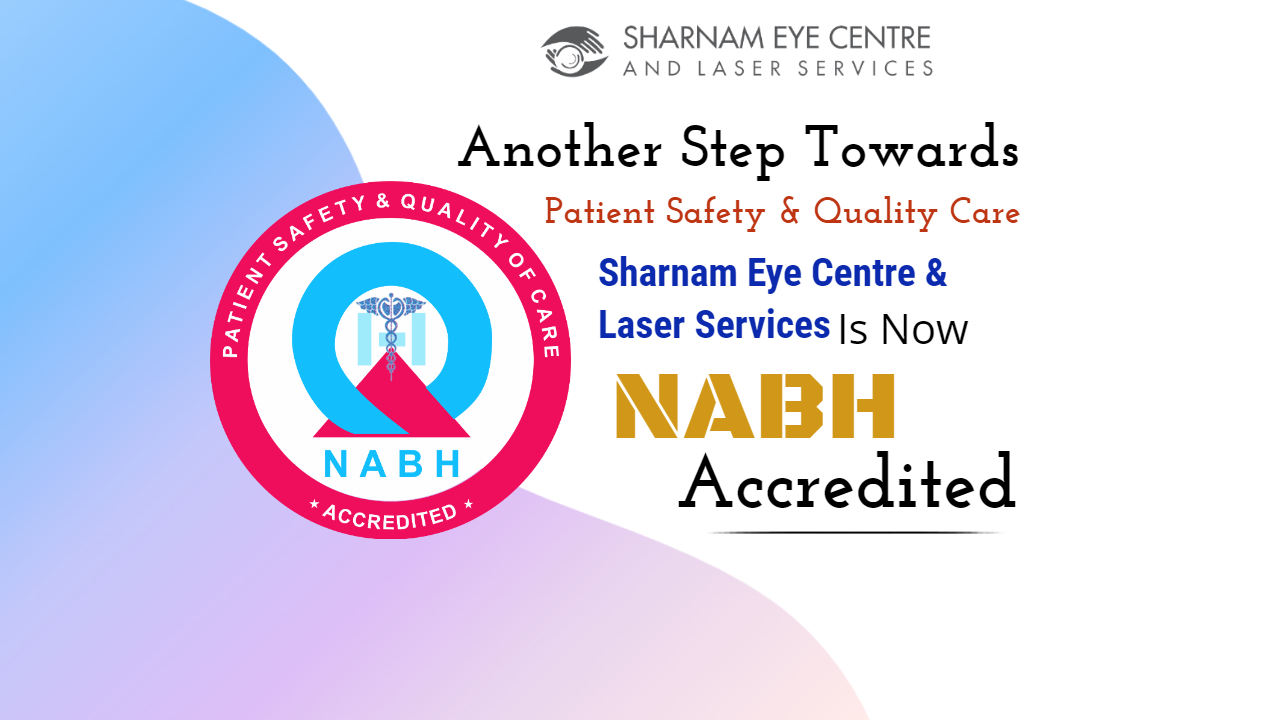Another step towards patient safety and quality care: Sharnam Eye Centre and Laser Services, Ghaziabad is now NABH Accredited.
NABH stands for National Accreditation Board for Hospitals and Healthcare Providers. It is an autonomous body that operates under the Quality Council of India (QCI) and is responsible for setting the standards and accrediting healthcare organizations in India.
Importance of NABH accreditation:
The NABH accreditation is a recognition that a healthcare organization has met the national standards of quality and patient safety. It covers various aspects of healthcare delivery, including patient rights and education, infection control, infrastructure and facilities, clinical care, and safety management.
Achieving NABH accreditation indicates that a healthcare organization has implemented best practices, adheres to national and international standards, and has a commitment to continuous quality improvement. It enhances the organization’s reputation, improves patient satisfaction, and ultimately leads to better health outcomes for patients.
What are the safety goals in NABH?
The National Accreditation Board for Hospitals & Healthcare Providers (NABH) has identified certain safety goals that healthcare organizations must achieve to obtain accreditation. These safety goals are designed to ensure that patients receive safe and appropriate care, and include the following:
Identify patients correctly: Healthcare organizations must ensure that patients are identified correctly by verifying their name, date of birth, and other relevant information at every encounter.
Improve effective communication: Healthcare organizations must establish effective communication systems between healthcare providers and patients, and between healthcare providers themselves, to ensure that patients receive safe and appropriate care.
Improve the safety of high-alert medications: Healthcare organizations must have processes in place to ensure the safe use of high-alert medications, such as insulin, opioids, and anticoagulants.
Ensure safe surgery: Healthcare organizations must implement processes to ensure that surgeries are performed safely, including verifying the patient’s identity and the surgical site, and ensuring that all necessary equipment and supplies are available.
Reduce the risk of healthcare-associated infections: Healthcare organizations must implement infection prevention and control measures to reduce the risk of healthcare-associated infections, including hand hygiene, environmental cleaning, and appropriate use of personal protective equipment.
Reduce the risk of patient falls: Healthcare organizations must implement fall prevention measures, such as identifying patients at risk for falls, using appropriate patient care equipment, and ensuring that patients receive assistance when needed.
Encourage patients’ involvement in their own care: Healthcare organizations must involve patients and their families in their care, including providing education about their condition, treatment options, and self-care.
By achieving these safety goals, healthcare organizations can ensure that they are providing safe and appropriate care to their patients, which is a fundamental requirement for NABH accreditation.
How does NABH accreditation benefit patients?
NABH accreditation benefits patients in the following ways:
Assurance of Quality: NABH accreditation indicates that the healthcare provider has met certain quality standards and has implemented processes to ensure patient safety and quality care. This gives patients the assurance that they are receiving care from a reliable and trustworthy healthcare provider.
Patient-Centered Care: NABH accreditation emphasizes patient-centered care, which means that the healthcare provider is focused on meeting the needs and expectations of the patient. This results in better communication, improved patient satisfaction, and better outcomes.
Improved Safety: NABH accreditation requires healthcare providers to have processes in place to ensure patient safety, such as infection control measures, medication safety protocols, and emergency preparedness plans. This results in a safer healthcare environment for patients.
Continual Improvement: NABH accreditation requires healthcare providers to continually assess and improve their processes and systems. This results in a culture of continuous improvement, which benefits patients by ensuring that the healthcare provider is always striving to provide the best possible care. Overall, NABH accreditation benefits patients by providing assurance of quality, patient-centered care, improved safety, and a culture of continual improvement.
If you are looking for NABH Accredited Eye Hospitals/Centre in Ghaziabad then Sharnam Eye Centre & Laser Services would be a better option for you.
Disclaimer: This content is for informational purposes only and should not replace professional medical advice, diagnosis, or treatment.



